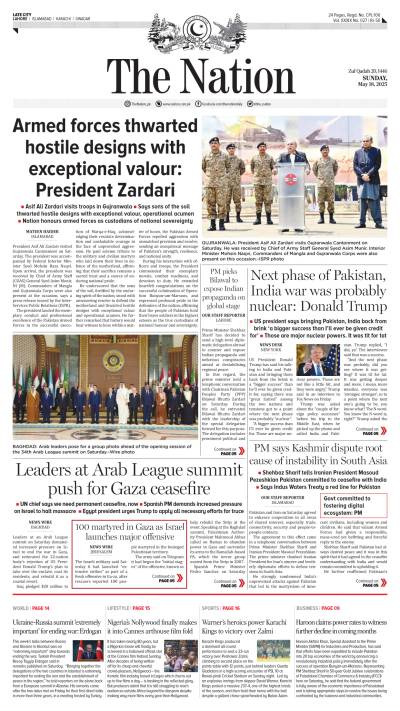Presently, Pakistan is witnessing a politico-legal drama that is running to packed audience on the media, in Parliament, press conferences and political rallies. The legality of Prime Minister Gilani to hold the august office after the Supreme Court verdict on his contempt case is forcefully being discussed at all forums. There are opinions for and against, and almost the whole spectrum of life across Pakistan seems to be fully engrossed in it. The real issues facing the masses domestically - power outage, gas loadshedding, rising prices, internal security, etc, have been relegated to a lower priority. We are witnessing the PML-N calling for ‘do or die’ long marches, and its opponent embarking on anti-judiciary rallies and coming up with corruption charges against the PML-N leadership.
While this drama is running to packed houses, powers that have geopolitical stakes in the region are analysing the situation in the light of their past experiences on ground and drawing lessons; obviously for application in future to fulfil their objectives. The Time magazine in its May 7, 2012, issue has drawn some pertinent lessons from the Abbottabad Operation of May 1, 2011, launched to take out Osama bin Laden. Though the lessons are US-specific, Pakistan and its military may appear an insignificant factor. However, their application has grave consequences for Pakistan. These lessons and how they impact Pakistan needs to be discussed at the highest forums that are responsible for the security of the country and its military assets; proper and effective responses need to be developed.
The first lesson drawn is that the “US government is capable of extraordinary performance in extraordinary circumstances.” There never was any doubt about America’s ability to strike anywhere in all circumstances at the time of its own choosing. It has been doing that for quite some time. Action in “extraordinary” circumstances makes the conclusion significant. Read this conclusion with relation to what “Kayani and his army colleagues concluded from this experience: if the US can swoop into Pakistan and take out bin Laden, could a future raid seize their nuclear weapons?” The analysts observed that after the Abbottabad episode “whatever the American officials say or do, Pakistan will presume the worst about the USA’s intentions.” The mention of Pak nukes and American intentions hint at the nature of “extraordinary” circumstances.
Washington’s intentions, however, in relation to Pak nukes have never been vague or ambiguous. The US and its protectorate Israel are wary of any such capability of any Muslim country. Back in 1970s, when late Z.A. Bhutto expressed the intention to have nuclear capability, he was threatened to be made into a “horrible example”; and he did end up as a horrible example. America attacked Iraq on trumped-up charges that under Saddam Hussein, it was building WMDs. They conned the entire world on this presumed threat. Next, Iran is being subjected to toughest inhuman economic and diplomatic sanctions to dissuade it from its nuclear ambitions. Israel has threatened to attack it to destroy its nuclear infrastructure and the USA has made no comments on this threat. The way events are developing in the region, an attack on Iran with or without the UN backing can come any time. In this scenario, Pakistan’s nuke capability also stands at a higher priority with the US-Israel psyche.
In the US threat assessments, Pakistan’s nuclear capability is assuming potent dimensions. Pakistan is “a nation that is in control of some 100 nuclear bombs…….the Obama administration’s attention is now fixed on the possibility that in the coming year, Iran will produce enough highly enriched uranium for its first bomb. But during these same 12 months, Pakistan will have produced enough material for at least 12 more nuclear weapons.” In this threat perception, the US analysts conclude: “So as we applaud extraordinary performance in this operation (Abbottabad raid) - from the low-level intelligence collectors and the helicopter maintenance technicians to the SEAL and the NSC process that supported a focused, determined Commander-in-Chief - we are left contemplating a discovery that means we are likely to soon face even more daunting challenges in the days and months ahead.” Conclusions do not need a genius to deduce what it implies. Pakistan’s nuclear capability is assuming a daunting challenge to the USA. The assessment also tacitly hints at possible actions that the USA can initiate at the time of its choosing.
Strategies to take out Pakistan’s nukes have been on the planning boards of US military top commanders. The Washington Post had leaked a story in 2010 that the American military was planning an attack on Pakistan to destroy them. In an article that was published in TheNation on June 29, 2010, I had given the options discussed at the planning level and leaked to the media. One scenario indicated ‘direct military intervention’ against Pakistan. The daunting challenge in the coming 12 months that the US military and NSC analysts perceive may compel them to initiate such a venture. The threat to Pakistan becomes more evident in the light of demonstrated US capability.
Pakistan’s status of alliance with the USA has undergone a drastic change. From being “ally-of-allies”, it has been relegated to the lowly status of a “nominal” ally. Its relationship with America is sarcastically compared with a cheating husband whose infidelity has been publicly exposed with no hope of recovery any time in the near future. In the backdrop of Raymond Davis exploits, Abbottabad raid, US Senate resolution on Balochistan, Salala attack and the Nato supply blockade, this relegation of alliance status is natural. This puts Pakistan in a precarious position in its bilateral relationship with the USA. Pakistan will not be on a nominal list where any operational secrets could be shared. The second most important lesson learnt from the raid is that “secrets matter and when they do secrecy matters more.” Those who planned the raid did not share the information about Abbottabad operation with some top military brass in Pakistan. It implies that if and when there is a venture against the Pak nukes only a select group will be in on it.
This whole expose may be scary and may also be a figment of the imagination. But, in military terms, one assesses the threat keeping in view the capability of the adversary; the USA has demonstrated such a capability and Pakistan must be mindful of that. Responses developed to the threat should be left to the professionals entrusted with national security. We are lucky we have been given a 12-month warning to buckle-up!
n The writer is a retired brigadier and political analyst.
Email: arjerral639@hotmail.com
Sunday, May 18, 2025
Pak-US relations - possible future design
DC reviews cleanliness efforts
May 18, 2025
Scorching heat in Lahore
May 18, 2025
Pak Army victory against India lauded
May 18, 2025
-
Lahore emerges among safest global cities in Numbeo 2025 index
-
Lahore emerges among safest global cities in Numbeo 2025 index
-
India’s suspension of Indus Water Treaty legally baseless
-
Seventh polio case reported in Pakistan amid nationwide vaccination drive
-
Pakistan reports sixth polio case of 2025
-
PTA begins issuing VPN licences to regulate usage
Culture Shift
May 18, 2025
Tactical Shift
May 18, 2025
Unmasked Cruelty
May 18, 2025
India Isolated
May 17, 2025
Descent into Hell
May 17, 2025
Fostering Entrepreneurship
May 18, 2025
Behind a Promising Job Offer
May 18, 2025
Indo-Pak Wisdom
May 18, 2025
Traffic Signal at Shahzad Town
May 18, 2025
English a Measure of Intelligence?
May 17, 2025
ePaper - Nawaiwaqt
Nawaiwaqt Group | Copyright © 2025





